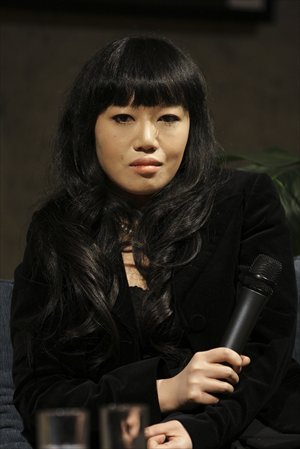Style over substance


The debate of style versus content has long existed, pitting the two forms as extremes against each other. Style may reflect the more superficial decorative bits of writing, while content stands for the actual story and plot. Arguing over what's more important may seem pointless and inconclusive, a matter of personal taste. After all, Herman Melville's great American novel Moby Dick can be dismissed to be mostly whale - unless a reader looks into the symbolism and metaphors to find more.
Thus, authors across the world will be debating the two forces in the Edinburgh World Writers' Conference, which for the first time this year included a panel in Beijing, presented in part by the Bookworm Literary Festival.
Held Saturday, March 16, at the Ullens Center for Contemporary Art (UCCA) in Beijing's 798 art zone, Scottish novelist, poet and travel writer Sophie Cooke and young Chinese novelist Zhang Yueran, moderated by British writer Keith Gray, discussed whether the content of a novel or the style in which it is written takes precedence.
Cooke's keynote and the panel questioned whether the two are mutually exclusive - does having ornate style in writing mean a lack of content, and does something heavy in content often lack style?
Both Cooke and Zhang agree that style and content must exist in harmony.
"Content is what happens … style is what makes it into a story," said Zhang, part of the generation dubbed the "post-1980s" era of authors in China.
"I can't speak for all writers, but for me, what I want to do is use a story to tell the truth about human beings - which is not a tall order," said the sarcastic Cooke, author of novels The Glass House and Under the Mountain.
The majority of the event was in Chinese, with translator Jonathan Rechtman providing English to Chinese translation. Appropriately, the predominantly Chinese audience was eager to apply the debate of style versus content to current trends and situations in China.
After opening up the floor to the audience, the first question was, "Why does it seem that science fiction and fantasy styles are popular in China?"
"In these types of science fiction and fantasy worlds, perhaps the worlds are an escape. People might appreciate this in a world that seems so complex," Zhang replied.
One man from the audience later chimed in on the matter, "Perhaps many don't have safety in their own real world."
Another question from the audience was about the schism between the older generation of writers in China and the emerging group of budding authors.
"The older generation often criticizes the newer generation of Chinese writers for immaturity or a perceived lack of content. I wonder how younger writers respond to that criticism, and what should young aspiring writers do?" asked an audience member.
Zhang said that in China, the older generation might hold content parallel to life experience.
"But I think that our everyday lives are a story. We may not have dramatic situations - but are only these considered content? If I sit here and do nothing, does that not have [meaning]? I think this is a very Chinese problem. We made content too big of a priority," she said.
When asked about if style ever evolves over time - as there is nothing truly new in this world - Cooke said, "The same problems do occur over and over - confronting mortality, losing the people we love. Rather than creating new songs, we recreate songs for the time we live in."
To continue the dialog, a video of the discussion will be available online through the Edinburgh World Writers' Conference site, where it will appear alongside the other literary conversations taking place across the world.